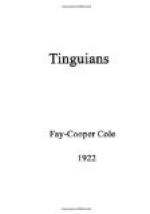According to many informants among the older men, it was formerly necessary, following the death of an adult, for the men to put on white head-bands and go out on a head-hunt. Until their return it was impossible to hold the ceremony which released the relatives from the taboo. [97] During the first two days that the body is in the house, the friends and relatives gather to do honor to the dead and to partake of the food and drink, which are always freely given at such a time; but there is neither music, singing, or dancing. [98]
On the morning of the third day, the male guests assemble in the yard, and after drinking basi they select one of their number and proceed to beat him across the wrist or thigh, with a light rod (Plate XVII). Two hundred blows are required, but since the stick is split at one end only, one hundred strokes are given. This whipping is not severe, but the repeated blows are sufficient to cause the flesh to swell. As soon as the first man is beaten, he takes the rod and then proceeds to apply one hundred and fifty strokes [99] to each man present, excepting only those whose wives are pregnant. Should one of the latter be punished, his wife would suffer a miscarriage. The avowed purpose of this whipping is “to make all the people feel as sorry as the relatives of the dead man.”
Burial in most of the valley towns is beneath the house, “as it is much easier to defend the body against evil spirits, and the grave is also protected against the rain.” In Manabo and many mountain villages, however, burial is in the yard. It is customary to open a grave already occupied by several of the relatives of the deceased.




